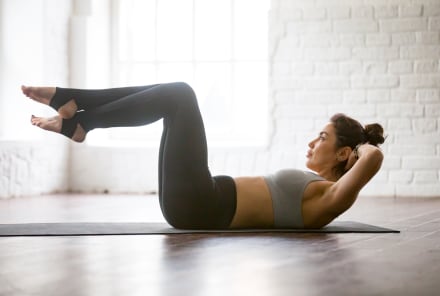Advertisement
How Much Do You Need To Run To Lose Weight? (Hint: Try Interval Running Instead)


Running is a great way to help lose weight and achieve health goals. It burns calories quickly; it's good for our physical, mental, and emotional well-being; and it's relatively low-cost.
But, as with most aspects of our well-being, there's a lot more to understand than what lies on the surface. So just how much do you have to run to lose weight? Let's break it down.
Meet The Expert
How much running is needed to lose weight?
There are around 3,500 calories in a pound of fat, and the average person burns around 8.5 calories per minute (meaning 30 minutes of running will burn about 255 calories).
So if you wanted to lose 5 pounds, you would need to run 180 miles if you didn't change anything else about your lifestyle! This is, of course, unrealistic for the majority of us, which is why it's important to factor nutrition into this equation.
Advertisement
Making smart choices with your nutrition will go a long way with losing weight while running. The safest weight loss is around 1 pound per week if you weigh under 150 pounds, and 1 to 2 pounds per week if you weigh over 150 pounds.
This will be a 500-calorie-per-day deficit through a combination of exercise and cutting calories.
Now you may be thinking, "The more I run, the more calories I burn," which would be true if our bodies weren't so great at adapting. The more often you run, the more efficient your body becomes—meaning you'll burn fewer calories doing the same amount of work the more time you do that work. Not to mention, overtraining increases your chances of injury.
Fortunately, interval running can help.
Summary
How interval running can help you lose weight
For new runners, even running for 30 minutes continuously might seem impossible—and this is where the walk-run method of training comes in and will actually help you to burn calories at a higher rate.
By alternating running and walking, not only are you able to extend the duration of your workout, but research has found that intervals allow you to run harder and faster on the running parts, which increases your caloric burn during and after activity.
Yes, that's right. After high-intensity intervals, your metabolism will be so revved up, it will continue to torch those calories for up to 14 hours1 after you stop.
Runners of all levels and abilities use interval workouts with walk breaks to get the most out of their workouts. As an elite runner myself, I can attest to this. Intervals a few times a week not only help me to be race-ready but also help with toning.
One thing to keep in mind, though: As running revs up your metabolism, your hunger increases, making it very easy to eat even more calories than you just burned.
So make sure your post-run meal is a proper portion and full of protein—this will ensure that you're satiated, your blood sugar is balanced, and your muscles have what they need to start recovering.
Summary
Workouts for first-time runners to lose weight
Now that we've determined that running is an effective method of weight loss that can help you lose 1 to 2 pounds per week, let's talk about how to start running if you're a beginner.
One of the greatest things about the interval running method is that you can decide what your walk-to-run ratios are and how many times you repeat them. This will depend on your fitness level, running experience, and speed.
Here's an example:
- Start by brisk walking for 10 minutes to warm up.
- Once you are ready to begin the intervals, run for two minutes, followed by one minute of walking.
- After the one-minute walk, run for another two minutes, and then do another one-minute walk.
- Repeat as many times as you can, and cool down with a 10-minute easy walk to bring your heart rate back down.
Over time, you should be able to increase the time spent running or the number of intervals.
Mix it up to keep your workouts interesting, and allow at least one day of rest between these workouts to recover.
You should be able to build your endurance to include combinations of continuous runs with no walking breaks (but run slow and easy!) and these interval-style workouts.
My best advice is to have some fun with it and enjoy the endorphin rush that follows a job well done. Even after 14 years of competitive running, I can tell you that feeling never goes away!
The takeaway
If you want to shed unwanted pounds, running is a step in the right direction. Having a regular exercise routine and eating a healthy diet are two powerful weight loss tools at your disposal.
It may take some time to reach the weight you're striving for, but hey, that's not necessarily a bad thing!
Research has found that people who lose weight quickly tend to gain it back quickly as well, whereas those who lose weight slowly will make the lifestyle changes to keep the weight off for good.
The safe way may be slower, but it'll keep your weight (and your sanity) from wildly fluctuating.

Short On Time? Try This Personal Trainer's 5-Minute Full-Body Workout
Krista Stryker, NSCA-CPT

Short On Time? Try This Personal Trainer's 5-Minute Full-Body Workout
Krista Stryker, NSCA-CPT

Short On Time? Try This Personal Trainer's 5-Minute Full-Body Workout
Krista Stryker, NSCA-CPT

Short On Time? Try This Personal Trainer's 5-Minute Full-Body Workout
Krista Stryker, NSCA-CPT









